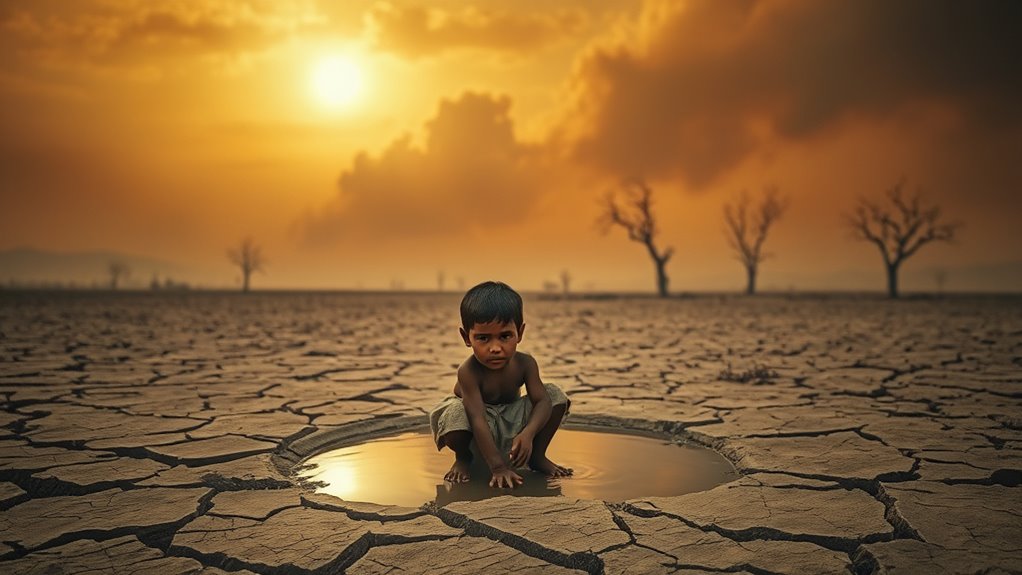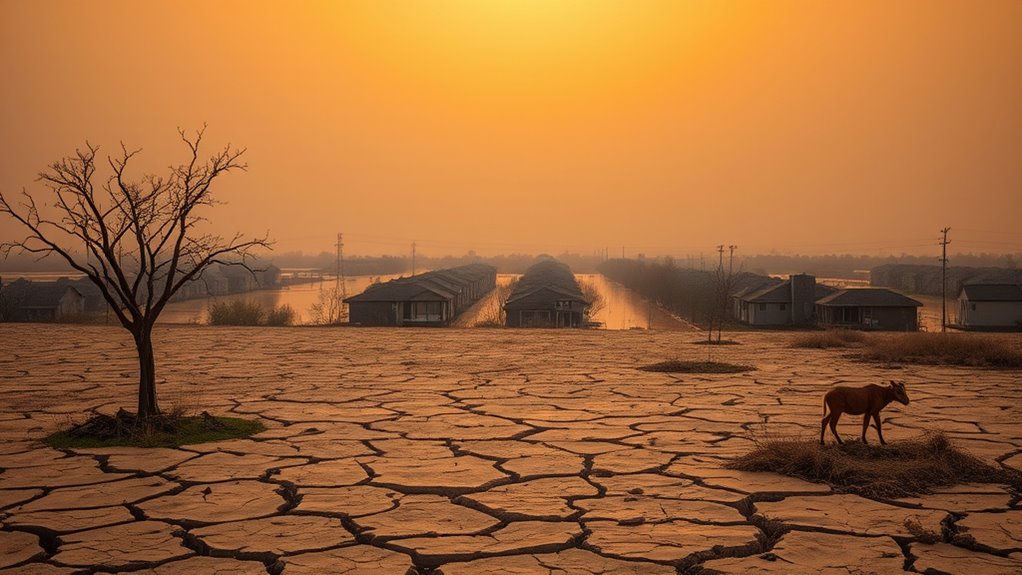Climate change impacts your health by increasing heat-related illnesses and spreading infectious diseases like malaria, dengue, and Zika, as shifting habitats and weather patterns expand the reach of disease vectors. Extreme weather events such as hurricanes and floods can displace communities, disrupting access to clean water and healthcare, which worsens health conditions and raises outbreak risks. To understand effective strategies to protect health and build resilient communities, exploring more details can help you stay informed.
Key Takeaways
- Rising temperatures increase heat-related illnesses and strain healthcare systems worldwide.
- Climate change expands habitats of disease vectors, spreading illnesses like malaria and dengue to new regions.
- Extreme weather events cause displacement, disrupting access to clean water and healthcare services.
- Air pollution from climate effects worsens respiratory and cardiovascular health globally.
- Water scarcity and contamination heighten risks of waterborne diseases, affecting vulnerable populations.

Have you ever wondered how climate change directly impacts your health and the well-being of communities worldwide? As the planet warms, the effects ripple through every aspect of daily life, especially in how we manage health risks. One of the most critical ways climate change influences health is through the need for effective climate adaptation strategies. These strategies aim to help communities adjust to changing conditions, such as rising temperatures, unpredictable weather patterns, and sea-level rise. Without proactive adaptation, vulnerable populations face increased exposure to health hazards, including heat-related illnesses, respiratory issues from air pollution, and water-borne diseases. Climate adaptation isn’t just about infrastructure; it’s about implementing policies and community programs that bolster resilience, ensuring that health systems can respond swiftly to climate-induced emergencies.
Effective climate adaptation strategies are vital to protect health and build resilient communities worldwide.
In particular, infectious disease control becomes more complicated as climate change alters the habitats of disease vectors like mosquitoes and ticks. Warmer temperatures and altered rainfall patterns expand the geographic range of these vectors, leading to the spread of illnesses like malaria, dengue, and Zika into regions previously unaffected. This shift demands that health authorities ramp up surveillance and vector control efforts sooner rather than later. You may not realize it, but these changes threaten to overwhelm healthcare systems, especially in low-income areas where resources are already stretched thin. Preventive measures, such as community education and improved sanitation, become even more crucial, but they require adaptive planning rooted in climate science.
Moreover, climate change increases the frequency and severity of extreme weather events—hurricanes, floods, droughts—that displace communities and disrupt access to clean water and healthcare. These disruptions heighten the risk of disease outbreaks and complicate existing health conditions. As someone concerned about global health, you should understand that integrating climate adaptation into public health policies isn’t optional; it’s essential to prevent a surge in preventable illnesses. Governments and organizations are now working to develop flexible strategies that can respond quickly to these crises, emphasizing infectious disease control and community resilience.
Ultimately, tackling climate change’s health impacts demands a proactive approach—one that prioritizes climate adaptation and strengthens infectious disease control measures. By supporting policies that promote sustainable development, clean energy, and resilient health infrastructure, you contribute to a future where communities are better prepared for the health challenges ahead. The connection between climate change and health is undeniable, and the actions you take today can help safeguard your community’s well-being tomorrow.
Frequently Asked Questions
How Does Climate Change Influence Mental Health Globally?
You might experience climate anxiety as you worry about the future, which can lead to feelings of helplessness and stress. Climate change challenges your mental resilience, making it harder to cope with everyday life. Globally, these feelings grow as people face extreme weather events and environmental changes. Building awareness and support networks can help you manage these emotions, strengthening your mental resilience against the ongoing impacts of climate change.
What Are the Economic Impacts of Climate-Related Health Issues?
You’ll see climate-related health issues drive up healthcare costs and insurance premiums. When more people experience illnesses from heatwaves, vector-borne diseases, or pollution, healthcare systems strain, leading to higher expenses. These increased costs get passed to you through higher insurance premiums. Consequently, climate change not only affects health but also puts a financial burden on individuals and governments, making access to affordable healthcare more challenging for everyone.
How Vulnerable Are Children and the Elderly to Climate-Induced Health Risks?
You’re more vulnerable to climate-induced health risks like poor air quality and heat vulnerability. Children’s developing immune systems can’t fight pollution as effectively, and they’re more prone to respiratory issues. The elderly are also at higher risk because of weaker immune responses and existing health conditions. Both groups face increased dangers during heatwaves and pollution spikes, making it essential to protect them from these climate-related health threats.
What Role Do Governments Play in Mitigating Health Impacts?
Governments play a vital role in mitigating health impacts by implementing effective policy measures and fostering international cooperation. You can support these efforts by advocating for policies that reduce emissions and strengthen healthcare systems. International collaboration helps share resources and knowledge, ensuring a unified response. Your involvement encourages governments to prioritize climate resilience, ultimately protecting vulnerable populations from climate-related health risks and promoting a healthier, more sustainable future for all.
Can Individual Actions Significantly Reduce Climate-Related Health Problems?
Yes, your personal responsibility and lifestyle changes can profoundly reduce climate-related health problems. By making mindful choices like reducing energy consumption, using public transport, and eating sustainably, you directly lower your carbon footprint. These actions not only help combat climate change but also improve your health through cleaner air and a healthier diet. Your individual efforts, combined with others, create a powerful impact in addressing global health challenges linked to climate change.
Conclusion
If you ignore climate change, you’re risking a health crisis so massive it could dwarf all previous disasters. The planet’s changing climate isn’t just a distant problem; it’s already threatening your health, from spreading deadly diseases to worsening air quality. You have the power to act now—every small effort counts. Together, we can turn the tide before the crisis becomes unstoppable. Your choices today will determine whether future generations thrive or suffer under an unlivable world.









